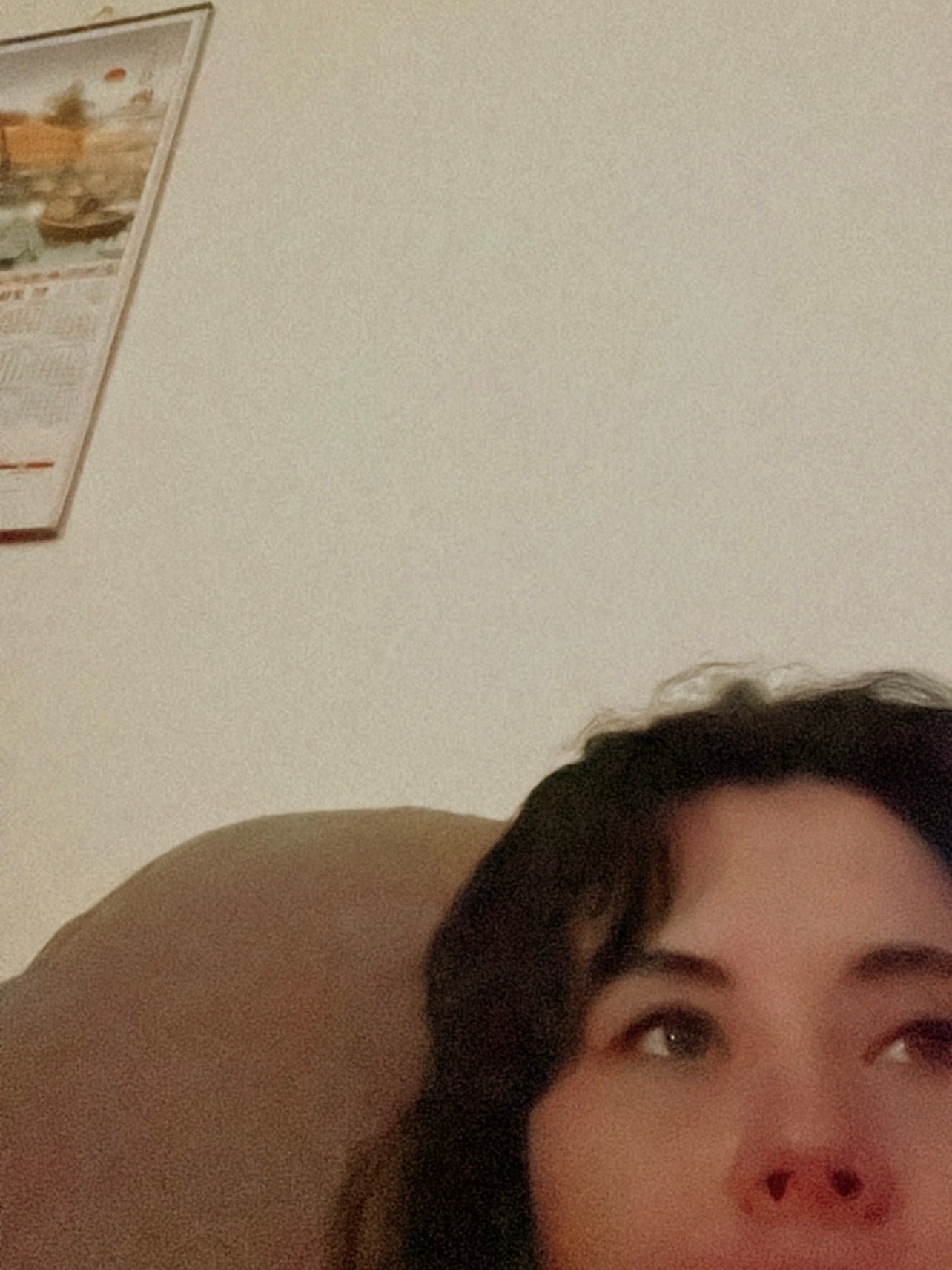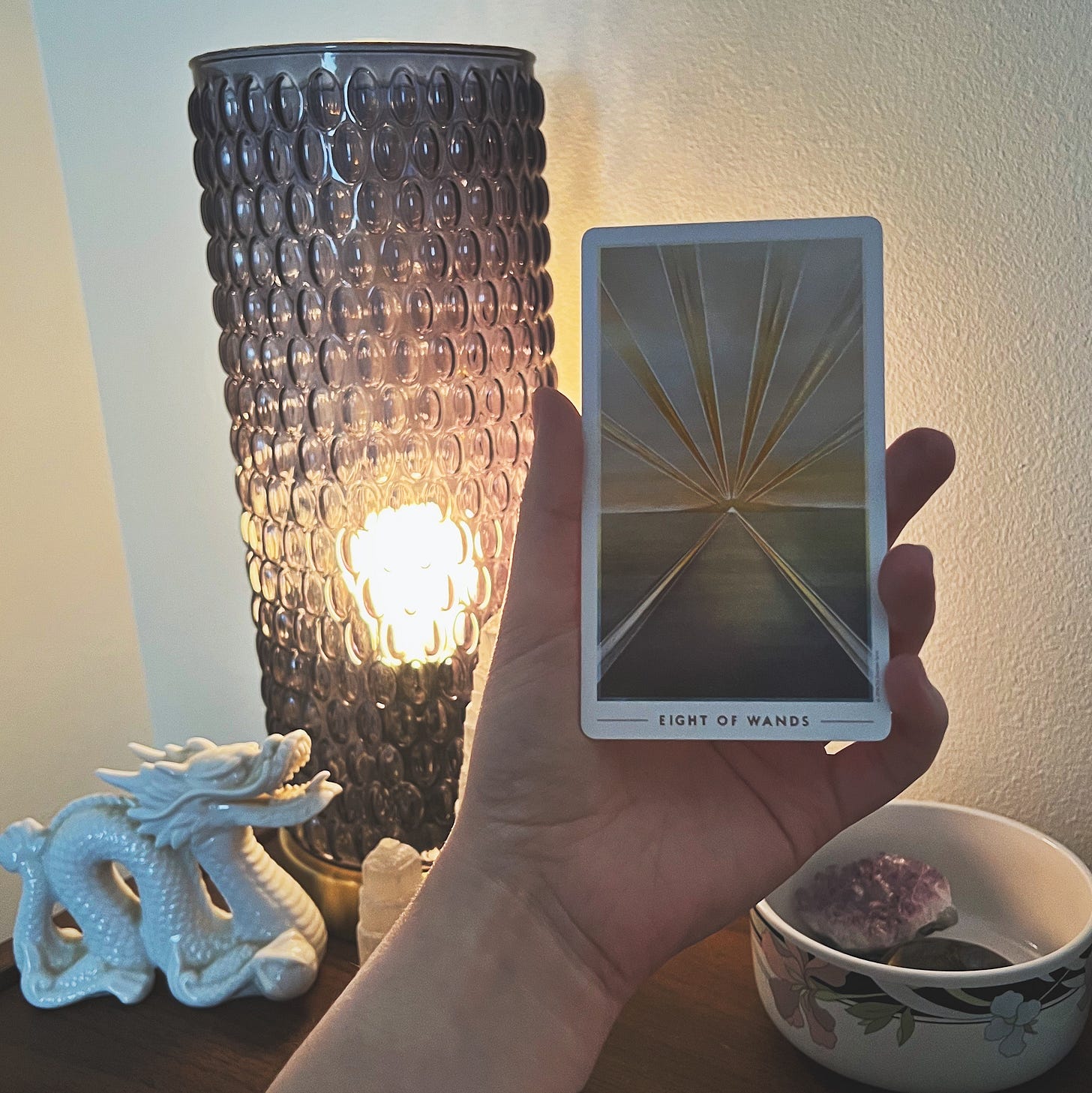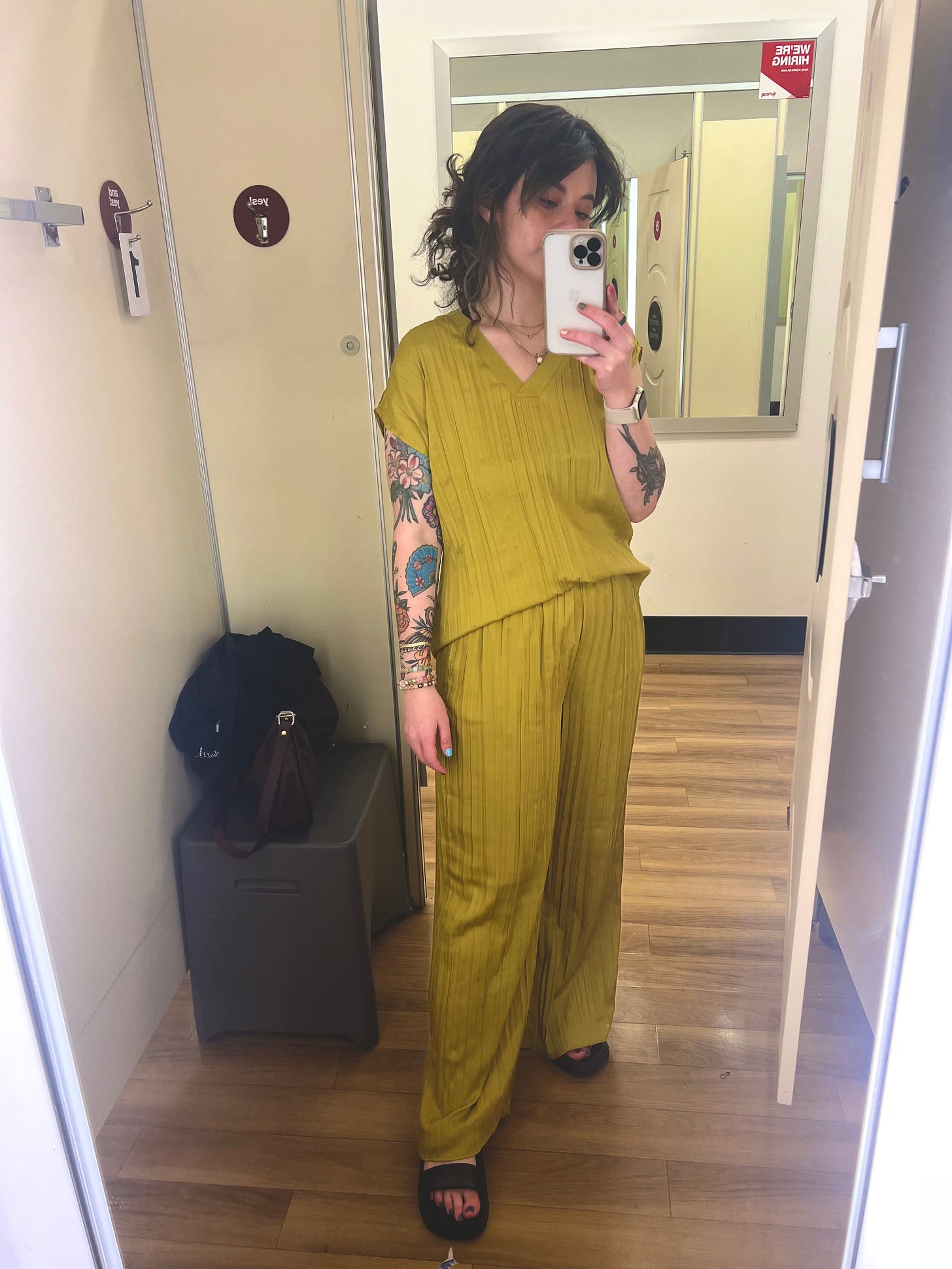An Interview With Myself: Introducing River Jack
I don't think I actually ever did this, but here we go
Writer’s Note: Some of these questions were compiled with the help of ChatGPT because sometimes I need a second brain to kickstart the thinking juices.
Who the hell are you?
You can call me River! I am a writer, and I work in publishing. A lot of my background centers around communication, film production, tarot, and internet culture. At the time of this interview, I am 29 years old. I’m a Cancer Sun, Sag Moon, and Scorpio Rising.
On my driver’s license, my eye color is listed as blue but they are more grey-toned and reflect blue and green. I’ve always had thick, puffy, curly hair. I’m a quarter Vietnamese, but my mother’s side of the family is born-and-raised Alabama blood.
I’ve got two bachelor’s degrees—Creative Writing and Communications. It took me 6 years to finish my first bachelor’s and 18 months to wrap up the second. To be entirely fair, Communications was a cakewalk after the English department.
I drive an old 2003 beige minivan because it was free, and I mostly work from home.
Is your name really River Jack?
I will only semi-address it because I have been asked this a few times by folks in different circles of mine. I do not use my given legal name online, but yes, call me River as that is who I am known as and have answered to for many years.
“Jack” is my late grandfather's name on my mother’s side. I do use my legal last name in my professional work. It helps create a little separation between representing the publisher I work for and my personal work.
I don’t name-drop the publisher very often, not because it is a secret, but because things on the internet are public. Even though I use a different surname on my profiles, occasionally one of my authors will follow me on Instagram or send me a friend request on Facebook. I don’t expect everyone to “get” what I do. And there are some I would prefer not up in my online, public business.
Personally, I believe in a separation between personal online personas/behavior and professional ones, but not everyone holds that mindset.
And ultimately, I don’t ever want something I do or say or publish to reflect negatively on the publisher. We are a small company and my team has put so much love and labor into it, and I am fiercely protective of them.
What’s it like working in publishing? Are you going to write about it?
You know, I didn’t even fully acknowledge that this was my career—my big girl, #adulting job—until the past year. I started as an intern while working on my English degree, and later I became a Developmental Editor. It also allowed me the opportunity to work with a few authors privately on self-publishing projects. Now, I’m pretty much the project manager and hand-holder for our authors. I’m the one setting the release schedule, getting titles ready for distribution, coaching authors through pre-launch activities, and answering any and all questions they throw at me.
I love working with authors. Don’t get me wrong, I get frustrated or heated or annoyed. There are so many different personalities that come down the pipeline, you can’t make everyone happy all the time. But I also have the opportunity to speak with so many people with incredible stories and backgrounds from all walks of life.
It is truly rewarding.
But the world of publishing is also greatly misunderstood and heavily romanticized. I have a lot of conversations with authors demystifying the realities of publishing a book.
I would like to create something for authors one day. I have written one or two pieces about publishing, but nothing like what I want to create. Ideally, it would be a properly niched newsletter or blog or PDF guide—I refuse to call it an ebook. That term has been co-opted by the digital entrepreneur community which I have strong opinions about.
I have been thinking about it more recently, but I need a little more bandwidth to make space for a project like that.
So what is “river is (almost) always right”? Why did you start this Substack?
Well, I started my Substack in 2022. To be honest, my time blindness has progressed dramatically since the COVID-19 pandemic, which I believe many other people have experienced as well.
It began as another endeavor to “start over,” “have a fresh start,” and “do it right this time.”
I am inconsistent, especially in comparison to prolific internet writers and creators.
I am fickle, especially with my work, my lifestyle, my hair, my clothes.
I have “re-branded” my Substack newsletter several times, to an audience of a few, and landed on something of an inside joke with myself.
That I am almost always right. I say “almost” to cover my ass, but more often than not, when the people in my life ask for advice or talk about, say the trajectory of their situationship, I am right about how the cards land on the table.
The name is also a nod to my time as a tarot reader. I still use tarot in my personal practice, but intuition never goes away. It may need a little coaxing every now and then, but it’s there.
Like I do with most “fresh starts” is hope that this will be it—the way in which I achieve…well, being a writer that people read and talk about. Nothing grand, nothing too crazy.
Do I think I’ll get rich and famous off my Substack newsletter? No, but hell, who knows!
What topics or subjects are you most passionate about, and why?
Online Living
At times, I’ll address internet culture or social media culture because there is absolutely an argument to be made for each distinction. But they live under the roof of Online Living.
The internet, social media, digital environments, all things being online are a part of our lives. Yes to varying degrees, but it is here and it is not going anywhere.
Fundamentally, I believe it is possible to have a healthy, meaningful, expansive relationship with online living.
I also believe we have no idea what we are doing, how to talk to each other, how to act, or what to do with all of it. Social media as we know it today is maybe 10 years old. Fifteen years ago, the internet looked and felt completely different.
How are we going to feel about seeing a Facebook memory from 20 or 30 years ago? I’m already floored by the “On This Day 13 Years Ago” posts I see on my account. It was such a different time.
And I’m passionate about it all—the creators, the creatives, the artists, the tech, the digital landscape—because I love it. It excites me, and I’m never exhausted to learn more.
Parasocial Dynamics
This goes hand-in-hand with Online Living. We live in a time when there are more folks than ever with audiences of over 100,000 or 500,000 or in the millions. Humans are not built to communicate with each other at this scale or be subject to the overwhelm of comments, tags, private messages, and views on something they publish online.
And yet, here we are.
The term “parasocial relationship” existed long, long before the internet, and it was a concept never imagined in relation to such technology. It is an accurate term in the space, but it is also misunderstood, misused, and misrepresented. Often, it is spoken of negatively—it is a bad thing to have a parasocial attachment to your favorite YouTuber or fictional character in the spicy fairy series.
The funny thing is, online creators and personalities have parasocial relationships with their audiences, which is a huge distinction between traditional parasocial dynamics (that remind exclusively unrequited) and those existing in online living.
Now this is a rabbit hole I will also follow all the way down.
Movies, TV, and Video Essays
I consume a lot of YouTube. I binge every limited series I’m recommended by a friend. I have a deep appreciation for cinema.
And yet, I don’t write about them all too often. I have not been much of a pedestrian reviewer or critic, but I am including it here as I may try my hand at it from time to time.
Can you share some of your long-term goals or aspirations for your Substack?
One day, in the future, I will not only write my book (don’t give me that sigh), but I will publish it. What I often tell my authors is the most valuable asset they can have is a mailing list. It is not new advice across the industry.
Yes, it would be nice to have a curated community of a few thousand folks to market a hypothetical book to, but that is not really my goal.
Instead, I just want to be a better writer. I’m thinking of it like training for a marathon, building up muscle, learning new skills, refining my strengths, and identifying my weaknesses.
I’ve worked one-on-one with authors who never wrote anything longer than a Facebook post before sitting down to write their book. And many authors are not writers and that is not a bad or pretentious thing at all.
However, I want to be better and get better. Not only do I want to get better about writing and publishing essays more often, but I want to garner feedback and comments. I cannot learn or understand what hits, what misses, what is too much or too little without feedback. It is the elixir of life for a writer—it is hard medicine.
So, I want my Substack audience to grow alongside my writing so I can write that damn book my psychic friends have told me for years I will someday write.
Wait, didn’t you say something about tarot?
Yeah, so it’s kind of ironic. Tarot and writing came to me around the same time. It was at a time in my life when I was living away from home, my friends, my life for the first time. While that was a challenging period for me for many, many reasons, I realized I was a writer (it was pretty obvious by then) and I started reading tarot.
My tarot reading business was my first entrepreneurial endeavor, but I closed the doors on that a few years back. To be honest, I could only handle the “oh we need to hang out soon, I totally need another reading” text message or DM so many times from friends and acquaintances. And I felt called to pull back on client readings.
Today, I still use tarot for myself. I do a lot of tarot journaling where I am writing out my inquiries and free-flowing whatever message comes through.
I’ve dabbled with bringing tarot into some of my writing here on Substack, so don’t be surprised if you see some tarot readings sprinkled into my content.
What do you hope your readers gain from following your Substack?
Hopefully, you won’t find me ruminating too much on the act of not writing. In all seriousness, I have always envisioned my Substack as my casual creative outlet. I’m not worried too much about making an essay perfect.
My hope for you, dear reader, is to find a few moments of “oh, wow I’m not the only one who thinks or feels this way about that,” with a dash of “damn, I never thought about it that way before.”
I hope you gain a sense of connection—not because I think I’m the shit (which I am, but that’s beside the point). I see online living moving into an era of slowing down, quieting down, and reassessing the triumphs and limitations. And in that space, I see people genuinely reconnecting once again. It is something we have all been hungry for for way too long.
Can you recommend a few of your favorite books, artists, or sources of inspiration?
George Saunders, The Braindead Megaphone
This book was part of the reading assignments one semester in college. I think it was the first collection of essays I ever read. The Braindead Megaphone—like The Anthropocene Review was for John Green—was Saunders’ first nonfiction collection.
I remember thinking, This is what I want to do, this is what I want to write, this is how I’ll do it. There are some fantastic essays in this book, and honestly, anything Saunders does is worth your time.
Jason Isbell
If I may make another recommendation in this vein—it’s a conversation between Saunders and singer/songwriter Jason Isbell which you can watch here.
Jason Isbell has almost a mystical approach to writing music. While you’re at it, you should probably listen to his guest appearance on Rainn Wilson’s podcast Metaphysical Milkshake.
Of course, I am a massive fan of Isbell’s music, especially his solo albums. He is a fantastic songwriter and storyteller, so please add his album Southeastern to your rotation. I cannot recommend it enough.
V. E. Schwab, Just anything this woman has written
Seriously, if you haven’t read The Invisible Life of Addie LaRue, I literally have no idea what you are doing with yourself. Schwab writes with a certainty, a clarity, a forwardness, and a beauty that I can only aspire to achieve with my own writing.
Her honesty about her ups and downs as writer—and a writer who got a lot more popular thanks to BookTok—that I’ve seen her share on Instagram is humbling and reassuring. Yes, success can be many things and look like many things, but the journey is never over. Getting there doesn’t solve all your problems or eliminate them from your life. And that’s real.
Some of my favorite channels on YouTube: Captain KRB, Solar Sands, Nexpo, Defunctland
What I appreciate most—outside of being a fan of their creations and the topics they cover—is the writing, the planning, the editing, and the execution.
I really hope one day to be as cool as these incredible creators, filmmakers, video essayists. If you want a recommendation of what to watch next, literally anything by these guys.
Do you have any advice for aspiring writers or content creators who may be reading your Substack?
Remember, you’re probably writing more often than you think. I write in my head all the time. And it wasn’t until I heard someone else point out it is something writers do that I ever realized I was doing it. Now, I just have to capture those moments more often.
You can start over whenever you want. You can make a fresh start on a new platform or with a new account. But at some point, you have to discern—is this serving a purpose or is it a distraction? If it will motivate you and take the pressure off, go for it. If not, well, go ahead and skip past the part where you apologize for not writing for a while and hop back on the damn horse.
Get up and go pee. Seriously. Quit holding your pee because you’re “in the middle of something.” Cut that out.
Pivot. Rebrand. Don’t feel boxed in by a niche or sticking to what’s “profitable” or better for SEO. So many more accomplished, successful, richer online creators will tell you to stick to a lane and master it. I’m telling you to ignore them, because I don’t think enough people are saying the opposite. Yes, at some point, it probably makes sense to have connective tissue with your body of work. But you know something? We’re multifaceted, we have a vibrant interior and external life full of different interests and knowledge and curiousities. We aren’t meant to be one thing forever. The connective tissue will always be you.
And most importantly, stop writing about writing. Stop writing about how to make passive income. Stop writing about how to work a side hustle. Stop writing about the same uninspired, repackaged, generalized advice. Trust me, there are enough people collecting clicks and skims doing that already. Just try saying something—anything—else.
Where Do You See Yourself in 5 Years?
I’ll be 34 and thriving. Golly, I hope so.
By then, I’ll be closer to publishing my book—my own nonfiction collection. And hopefully, you’ll be there too, watching my writing get better, my understanding of it deeper, and finally no longer complaining so much to myself about not writing enough.








How cool, you read tarot too. I also study astrology.